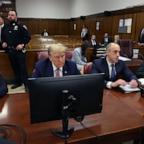Rebuilding Iraq -- Book by Book
May 3, 2006 — -- A growing number of college students have emptied their backpacks for a good cause.
Instead of selling back their textbooks to the bookstore or letting them gather dust in their basements, students at a handful of universities have donated their used books to Iraq's war-torn capital.
The program, "Books for Baghdad," collects and distributes textbooks in science, mathematics and technology (some of the few subjects taught in English in the Middle East) and transports them to the University of Baghdad and its library in Iraq.
Safaa Al-Hamdani, an Iraqi-born American citizen, created the program in 2004. He teaches biology at Jacksonville State University in Alabama, and is an alumnus of Baghdad University. It was during a trip back to his alma mater that he became aware of the dire need for textbooks. Speaking with faculty members there he learned that many of the textbooks they used were 30 to 40 years old.
The outreach effort began on a corner table in Al-Hamdani's biology lab, but "Books for Baghdad" has now evolved into an international program, reaching campuses in England, Canada and the United States, where students and faculty have created similar book drives.
"I was reading about Iraq every day in the papers, and I just felt like I needed to do something productive," said University of Rochester sophomore Erik Tobiason, who started his school's drive.
Tobiason teamed with students in the Community Service Club and an Arab Club to spread the word on campus. Through concerts and table displays on campus, the students have collected a modest number of books. They hope that more book donations will come rolling in as finals conclude.
Mike Monteleone, a junior at the University of Chicago, helped collect more than 800 books in last year's book drives. He said he became involved in "Books for Baghdad" because he liked the cause. "I was so sick of all the division the war was creating on campus. ... This program steps aside from all partisanship surrounding the war and drew in both Democrats and Republicans and people of all religions and ethnic groups," he said.




